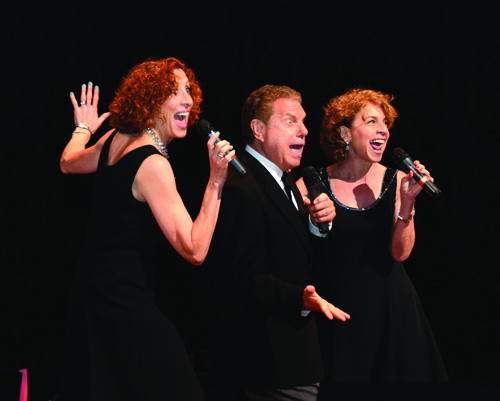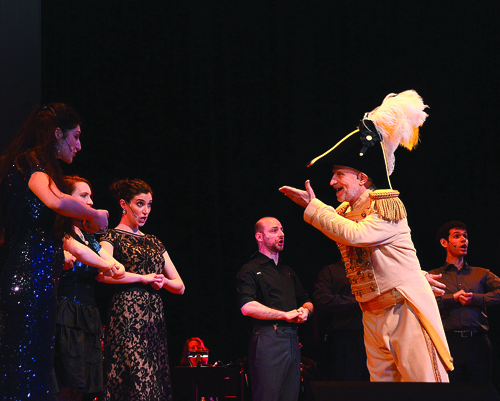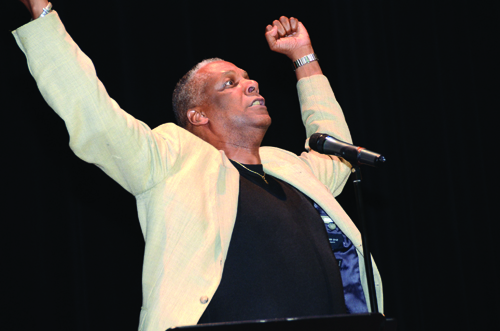

The vibrant, ever youthful Bryna Wasserman, Executive Director of The National Yiddish Theater-Folksbiene greeted a sold out house at the NYU Skirball Center in Manhattan for the theater’s annual Gala. Her enthusiasm was contagious. Where some institutions with as rich a history might offer a review of accomplishments past, the Folksbiene is on a rocket ride forward, planning plays and festivals that will take it into its second century with bells, whistles, pirates and plumes. The gala was produced by Folksbiene artistic director Zalmen Mlotek and Moshe Rosenfeld of Golden Land Productions.

Stephen Mo Hanan, a Broadway and Folksbiene veteran, opened the show as the exuberant Captain who led a rendition of The Pirates of Penzance/Di Yam Gazlonim. With the feathers in his hat bouncing to the beat, the Captain and his entourage of maids and swabies sang the Gilbert and Sullivan classics in Yiddish.
Board Chairman Jeffrey Wiesenfeld expressed his gratitude to Honoree Morris Offit for helping the NYT/Folksbiene create “one of the most successful galas in its history… A great mitzvah shared, thanks to Morris,” said Wiesenfeld. Noting that the theatre’s 100th anniversary was approaching, he reminded everyone that it’s all about Hemshekh, continuity. “Our culture is out there,” said Wiesenfeld, and presented a “Citation of Gratitude” for four decades of service to Itzy Firestone: a character, an actor, a character actor, Folksbiene Ambassador and ticket super-salesman. Sandy Cahn, the evening’s Co Chair, talked about the theater’s outreach to the communities of Yiddish-speaking Russians, noting that Genesis and COJECO are bringing Yiddish theater to young Russians.
Mike Burstyn, the emcee for the night, looked to history and an exploration of the common elements of the Jewish and the Black experience in America. He introduced the Robeson-esque Elmore James, who took to the stage and belted out Old Man River in Yiddish, which earned him a standing ovation. Tony-Award winner, Eleanor Reissa, another Folksbiene favorite, enchanted the crowd with a song about borsht. “I have never eaten such a borsht,” she sang. Somehow, in Yiddish, even a menu has emotional flavor, tearing at the heart (before the stomach)—with every dish an analogy for a life experience. Gefilte fish tops it all, down to the last note.
“Ich hob lieb di Folksbiene, I love the Folksbiene!” blazed Judy Blazer, and she adores Academy-Award winner Joel Grey, too. She almost gushed as she presented the Lifetime Achievement Award to the acclaimed Grey for his extraordinary contribution to American film and theater. Said she, “Joel Grey is a shared idol – the idol of a character actor, the idol of a song and dance man, and the idol of every young performer….The truth is, there is nobody like Joel Grey. He is his own category.”
Grey is a man of small physical stature—until he opens his mouth. “Yiddishkeit has meant so much to me in my life,” said Grey, and after a little patter, began to sing, filling the entire stage with song and expression, and earning, as usual, a standing ovation.
He was a tough act to follow. “I didn’t realize the goy from South Dakota would follow the Jewish superstar,” began Tom Brokaw, the legendary journalist. “How bereft the country would be without all the artists and performers who had their origins in Yiddish theater.” Brokaw called himself “an assimilated Jew, who became the Shabbos goy for so many friends. It has so enriched my life.” Brokaw drew warm laughter as recalled his “goy anxiety” during a series of broadcasts from Jerusalem. He related misreading a sign on a commode “lift gently to flush” as “lift Gentile to flush.” The house roared. Brokaw had come to the Folksbiene at the invitation of his friend, Morris Offit, a friend “who would hide me,” should hiding be needed.
Offit returned his friend’s warmth, calling Brokaw “a voice of America.” The financier expressed a heartfelt thank you to the Folksbiene for “touching my soul with the culture you lovingly communicate.” He called for “creating new and dynamic works that inspire the next generation,” and “creating a permanent home for the National Yiddish Theater/Folksbiene (NYT-F). He pitched like this: “A bissel und a bissel macht a filleh schissel!” (A little bit plus a little bit, fills the bowl.)
Eleanor Riessa, Joanne Borts and Mike Burstyn, three Folksbiene veterans who have given untold hours of joy to Folksbiene audiences, invigorated the crowd with their renditions of old time favorites. Bei Mir Bist Du Sheyn rocked the house and had audience members bouncing in their seats and singing along. The Folksbiene Troupe performed throughout, and included a lively duet that channeled the incredible Barry Sisters.
Mark Mlotek, President of the theatre’s board of directors, took to the stage to announce plans of the NYT-F’s plans to take over New York City for their 100th anniversary in 2015 with the unprecedented International Jewish Theater Festival. It will be dedicated to the Mlotek family matriarch, Chana, who with her husband Yosl, spent the post-war years tracking down snippets of Yiddish songs and melodies that would have been lost forever. The NYT-F, he said, is “vital to the cultural and spiritual health of the Jewish people and brings this culture to Jews throughout the world.” He introduced Stanley Bergman, the newly elected head of the American Jewish Committee, who has donated the seed money for the huge project. Said Bergman, “We stand on the shoulders of the many millions. Shoulder to shoulder, we will create a glittering, star- studded festival of Jewish arts. Am Yisrael Chai!”
Ido Aharoni brought greetings from the State of Israel. Calling Yiddish “a part of the Jewish people’s vernacular, our culture, our identity,” he revealed that his Yemenite mother could hold a conversation in Yiddish. “We all learned Yiddish from our dentist! So you can imagine what our teeth were like!” He also admitted that the Israelis had done what they could do discourage the use of Yiddish as a language. Happily that was one battle the Israelis lost!
For the finale, children from local day schools danced down both aisles to the front of the house, filling the stage with songs and joy. They sang of rainbows in mamaloshen and English, reminding everyone that Yiddish is a living, joyous language, full of life and color.
For the seven hundred in attendance, this was an evening to celebrate the richness of the past. Even more so, it was an invitation to strengthen, preserve and continue a tradition that has been with our people for a thousand years and, after a 100 years, reminded them it was time to give the oldest, continuously running theatre company in America a home of its own.
By Maxine Dovere










